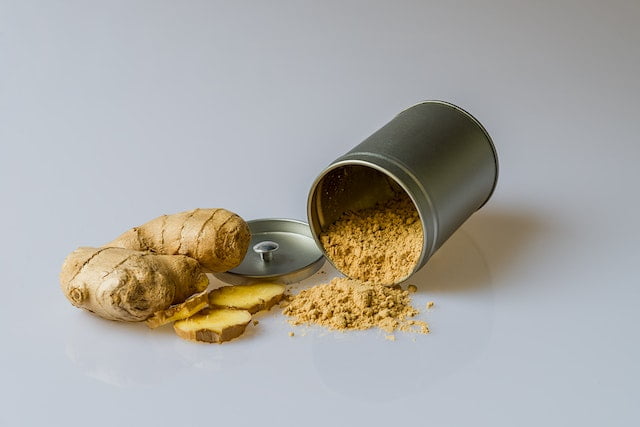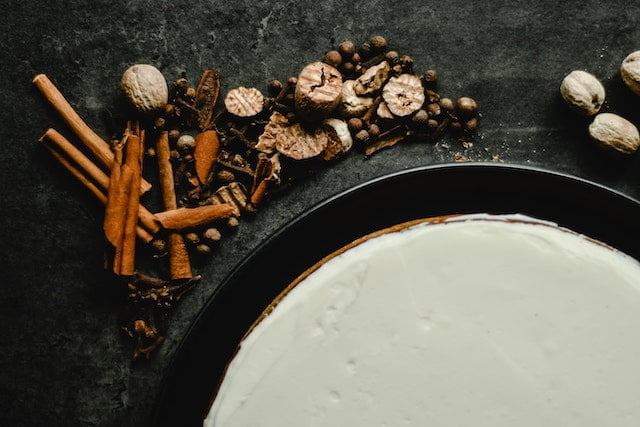Table of Contents
As the vibrant fall leaves pile up, we are diving into the many health benefits of the spices found in the beloved pumpkin spice blend. Last month, we looked at how cinnamon can benefit us through antioxidants, antibacterial and antifungal qualities, mitigating insulin resistance, and improving cognition. This month, we will look at how ginger and nutmeg can support our health. Not only do they have their own qualities, but these two spices also share a lot in common.
Origins of Ginger and Nutmeg

Ginger belongs to the Zingiberaceae family with close relatives turmeric and cardamom. It is a flowering plant native to Southwest Asia and its bioactive compound is gingerol. While our Western world tends to enjoy it in desserts such as cookies, gingerbread, preserves, and tea, it tends to pair with meats and vegetables in more savory dishes from Asian, Caribbean, and Indian cuisine.
Nutmeg originally hails from Indonesia and is harvested from a tropical evergreen tree called Myristica fragrans. Similar to ginger, it is used in savory dishes like curries in the East but often in tea and desserts in the West.
Flavor and Favor
If you have tried these two spices alone, you will notice right away that their flavors are very different — nutmeg tends to have a woody taste while ginger has a spicy, peppery taste. These flavors tend to be quite complimentary in cooking, which is why you will find both in the pumpkin spice blend and in teas, baked goods, and even curries. Despite their differing flavors and origins, ginger and nutmeg share many health benefits for those who indulge in them.
Ginger for Heart Health
To have healthy hearts, our arteries need to be clear. In a complex relationship between inflammation, high triglycerides and oxidative damage, LDL cholesterol particles can contribute to atherosclerotic plaque buildup in the arteries, which results in arterial narrowing. This can increase one’s risk for heart attack, peripheral artery disease, and stroke.
A daily dose of 1,500 mg of ginger was found to lower LDL cholesterol particles and triglycerides in a review of studies on humans. Taking high-dose nutmeg extract also lowered LDL cholesterol particles and triglycerides in rats, though human studies still need to be conducted to find the efficacy and right dosage for humans.
Fighting Oxidative Stress & Inflammation with Spices
These warming spices — like cinnamon — are fighters for our immune health and our system’s state of calm. Oxidative stress occurs when there exists an imbalance between free radicals and antioxidants in the body. The more antioxidants the body has, the more free radicals can be neutralized. Since oxidative stress causes aging and can exacerbate the disease process in the body, antioxidants become important allies in the fight for overall health.
In a study where rats were given a medication that causes oxidation, those taking nutmeg experienced less tissue damage than those who did not take it. Ginger can also decrease oxidative stress through the presence of powerful antioxidant polyphenols.
Chronic inflammation can be the basis of many diseases. Compounds in nutmeg called sabinene, terpineol, and pinene prevent the action of inflammatory enzymes — which could slow inflammation for autoimmune and other inflammatory conditions.
Participants in a study who had osteoarthritis who took 0.5-1 gram of ginger daily throughout 3-12 weeks reported reduced pain. However, more research needs to be done on the overall efficacy of ginger on arthritis.
Ginger is also linked to reducing symptoms of the autoimmune skin disease psoriasis by decreasing a particular activator within the body that, when overactive, can cause overactive immune function.
Lowering Blood Sugar Levels
Looking at most pumpkin spice products will show that the flavor combination seems to first exist to satisfy our sweet tooth. Yet, the beauty of these spices is that they also have a blood sugar-altering component. This can never reverse the effects of overly processed sweet treats, but when used with natural sweeteners or especially savory foods, it can take less of a toll on our blood glucose levels.
High doses of nutmeg resulted in lower blood sugar levels and supported pancreatic function in a study on rats. Since the pancreas produces insulin, which is often chronically over-produced to the point of resistance in those with type 2 diabetes, it is important to also have support for this vital organ to function properly.
Ginger can reduce body weight and fasting glucose while not increasing insulin levels. This is a perfect combination for those who are diabetic or pre-diabetic. One study found that taking 1,200 to 3,000 mg daily for 12 weeks is enough to start seeing results. Other findings suggest that ginger may not reduce fasting glucose. This particular research did find that it reduces levels of hemoglobin A1C, an indicator that shows average blood sugar levels over 2-3 months prior.
Supplementing ginger may be helpful for lowering your risk of insulin resistance. However, it is important to consult your doctor before starting.
Fighting Infection
This spicy duo can also fight both bacterial and fungal infections. Both nutmeg and ginger can inhibit the growth of Streptococcus mutans and E. coli. Nutmeg also can combat Aggregatibacter actinomycetemcomitans, which, along with Streptococcus, can cause problems with our oral health and lead to gum disease. Ginger can inhibit the propagation of Candida albicans, a common fungal overgrowth in the gut that can be linked to (but not solely due to) stress and overconsumption of carbohydrates.
How Nutmeg and Ginger Differ
As with most pairs, each part has its own unique attributes.
Nutmeg may boost mood, due to its antidepressant qualities shown in a rat study. More research needs to be conducted on humans to verify. It may also increase libido due to the way it stimulates the nervous system.
Ginger can decrease symptoms of nausea, making it especially helpful for pregnant women with morning sickness in their first trimester, as well as those who are experiencing nausea due to chemotherapy treatment. It’s best to avoid supplementing with ginger, however, if there is a history of miscarriage or vaginal bleeding, as ginger can cause blood thinning. If you are pregnant, consider talking to your doctor before taking large amounts of ginger.
Those who struggle with indigestion will find a trusty friend in ginger. It helps food pass more quickly through the stomach when it feels uncomfortable and can decrease bloating and intestinal gas. Eating ginger or drinking it in the form of tea before a meal can help decrease symptoms of indigestion.
Women who experience menstrual pain but want to avoid NSAIDs may be relieved to find that supplementing with ginger can provide similar relief to its over-the-counter counterparts.
Finally, compounds within ginger called 6-shagaol and 6-gingerol may support the prevention of Alzheimer’s disease due to their anti-inflammatory properties.
With so many potential benefits within these flavorful compounds, there are many reasons to add these spices to your weekly cuisine. Since they are so versatile, consider bringing them into unique aspects of your meals.
Ginger and Nutmeg Recipes

Ginger:
Nutmeg:
Bringing this fabulous duo of spices into your meals will surely warm your tummies, boost your health, and bring new dimensions of flavor to your palate.
Optimize Your Health Through Nutrition Education
Whether you are wanting to make nutrition your career, or are just interested to learn more about optimizing health. NTI is committed to creating optimal wellness through nutrition education. We would be delighted to be a part of your journey in upleveling your health through nutrition. Start your journey into nutrition education by attending an informational webinar to learn more about how you can start changing lives, even before you graduate!
About the author: Lisa (Driscoll) Lopes is a certified Nutrition Therapist Master through NTI’s Nutrition Therapist Master Program. Having studied journalism and vocal performance in undergrad, she enjoys using her voice to share the benefits of living a holistic, integrated lifestyle in writing. You can find more of her writing in the Baltimore Sun, Classical Singer Magazine, Capital News Service, and FOCUS blog.
Images:
- Header image by Eva Bronzini from Pexels
- Image by Pixabay from Pexels
- Image by Eva Bronzini from Pexels





More Stories
The One Thing You Should Never, Ever Do if You Have Insulin Resistance and Want to Lose Weight
Tuna Salad Lunch Box – JSHealth
Advanced Wellness Course – Heart Health